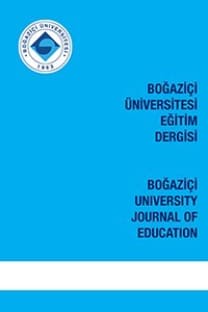ODİ İletişimi: Pedagojik Katalizörden ODİ Oyun Değiştiriciye
Anahtar Kelimeler:
İngiliz Dili Öğretimi (İDÖ), ODİ farkındalığı, pedagojik ortak dil yaklaşımı, BENİM İngilizcem, konuşmacı-öğrenci özgürlüğü
ELF Communication: From Pedagogical Catalyst to ELT Game Changer
Raising speaker-learners’ and their teachers’ awareness of the possibilities and challenges of authentic ELF communication is a powerful catalyst in the process of understanding what it means to be out in the wild. But where do they turn for orientation when it comes to their own spoken and written productions? From a social constructivist perspective, I argue that ELT’s standard native speaker orientation is not the problem. Rather, what counts is what speaker-learners are allowed and encouraged to do with it. Against this backdrop, I propose a pedagogical lingua franca approach that moves ELF communication from a position outside ELT to a game changer position inside ELT and helps learners develop their own voice as emancipated non-native speakers of English.
Keywords:
ELF awareness, ELF pedagogy, pedagogical lingua franca, social constructivism, speaker-learner emancipation,
___
- Bayyurt, Y., Kurt, Y., Öztekin, E., Guerra, L., Cavalheiro, L., & Pereira, R. (2019). English language teachers’ awareness of English as a lingua franca in multilingual and multicultural contexts. Eurasian Journal of Applied Linguistics, 5(2), 185–202. https://doi.org/10.32601/ejal.599230
- Cogo, A., & Dewey, M. (2011). Analysing English as a lingua franca. A corpus-driven investigation. Continuum.
- Cogo, A., & Siqueira, S. (2017). “Emancipating myself, the students and the language”: Brazilian teachers’ attitudes towards ELF and the diversity of English. Englishes in Practice, 4(3), 50–78. https://doi.org/10.1515/eip-2017-0003
- Dewey, M. (2012). Towards a post-normative approach: Learning the pedagogy of ELF. Journal of English as a Lingua Franca, 1(1): 141–170. https://doi.org/10.1515/jelf-2012-0007
- Hall, C. J., Wicaksono, R., Liu, S., Qian, Y., & Xiaoqing, X. (2013). English reconceived: Raising teachers’ awareness of English as a “plurilithic” resource through an online course. British Council.
- Hall, C. J., Wicaksono, R., Liu, S., Qian, Y., & Xu, X. (2017). Exploring teachers’ ontologies of English: Monolithic conceptions of grammar in a group of Chinese teachers. International Journal of Applied Linguistics, 27(1), 87–109. https://doi.org/10.1111/ijal.12107
- Kiczkowiak, M., & Lowe, R. J. (2018). Teaching English as a lingua franca. The journey from EFL to ELF. Delta Publishing.
- Kirkpatrick, A. (2014). Teaching English in Asia in non-Anglo cultural contexts: Principles of the ‘lingua franca approach’. In R. Malina, & R. Giri (Eds.), The pedagogy of English as an international language (pp. 23–34). Springer.
- Kohn, K. (2018). MY English: A social constructivist perspective on ELF. Journal of English as a Lingua Franca, 7(1), 1–24. https://doi.org/10.1515/jelf-2018-0001
- Kohn, K. (2019). Towards the reconciliation of ELF and EFL: Theoretical issues and pedagogical challenges. In N. C. Sifakis, & N. Tsantila (Eds.), English as a lingua franca for EFL contexts (pp. 32–48). Multilingual Matters.
- Kohn, K. (2020a). A pedagogical lingua franca approach: Emancipating the foreign language learner. LEARN Journal, 13(2), 1–14.
- Kohn, K. (2020b). Foreign language teaching from a pedagogical lingua franca perspective. Status Quaestionis, 19, 55–72. https://doi.org/10.13133/2239-1983/17140
- Kohn, K., & Hoffstaedter, P. (2017). Learner agency and non-native speaker identity in pedagogical lingua franca conversations: Insights from intercultural telecollaboration in foreign language education. Computer Assisted Language Learning, 30(5), 351–367. https://doi.org/10.1080/09588221.2017.1304966
- Lopriore, L., & Vettorel, P. (2016). A shift in ELT perspective: World Englishes and ELF in the EFL classroom. In N. Tsantila, J. Mandalios, & M. Ilkos (Eds.), ELF: Pedagogical and interdisciplinary perspectives (pp. 8–15). Deree – The American College of Greece.
- Mauranen, A. (2012). Exploring ELF. Academic English shaped by non-native speakers. Cambridge University Press.
- Seidlhofer, B. (2011). Understanding English as a lingua franca. Oxford University Press.
- Seidlhofer, B., & Widdowson, H. (2017). Competence and capability. Lingue e Linguaggi, 24, 23–36. https://doi.org/10.1285/i22390359v24p23
- Sifakis, N. C. (2019). ELF awareness in English language teaching: principles and processes. Applied Linguistics, 4(2), 288–306. https://doi.org/10.1093/applin/amx034
- Sifakis, N. C., Lopriore, L., Dewey, M., Bayyurt, Y., Vettorel, P., Cavalheiro, L., Siqueira, S., & Kordia, S. (2018). ELF-awareness in ELT: Bringing together theory and practice. Journal of English as a Lingua Franca, 7(1), 155–209. https://doi.org/10.1515/jelf-2018-0008
- Siqueira, S. (2020). ELF with EFL: What is still needed for this integration to happen? ELT Journal, 74(4), 377–386. https://doi.org/10.1093/elt/ccaa038
- Vettorel, P. (2018). ELF and communication strategies: Are they taken into account in ELT materials? RELC Journal, 49(1), 48–73. https://doi.org/10.1177/0033688217746204
- Widdowson, H. (1998). Context, community, and authentic language. TESOL Quarterly, 32(4), 705–716. https://doi.org/10.2307/3588001
- Widdowson, H. (2003). Defining Issues in English language teaching. Oxford University Press.
- ISSN: 1300-9567
- Yayın Aralığı: Yılda 2 Sayı
- Başlangıç: 1976
- Yayıncı: Boğaziçi Üniversitesi
Sayıdaki Diğer Makaleler
ÖĞRETMENLERİN UZAKTAN EĞİTİMDE YAŞADIĞI SORUNLARIN SIRALAMA YARGILARI KANUNUYLA ÖLÇEKLENMESİ
Mahmut Sami YİĞİTER, Selahattin GELBAL
Fen Bilimleri Öğretmenlerinin Üst Düzey Öğrenme Düzeyini Ölçen Soru Geliştirme Öz-Yeterlikleri
Ahmet BOLAT, Sevilay KARAMUSTAFAOĞLU, Özgen KORKMAZ
Eğitimde Ölçme ve Değerlendirme Uygulamaları Ulusal Kongresi Özel Sayısı
Paraskevi THOMOU, Christina TEGOU, Thomais ROUSOULİOTİ
